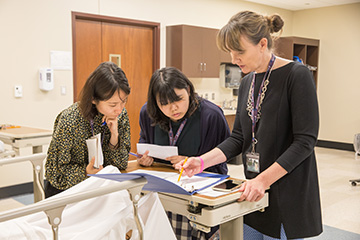
As faculty in Samford University’s McWhorter School of Pharmacy work to finalize its new Doctor of Pharmacy curriculum for the 2020-21 academic year, one thing is known for certain: The school’s new curriculum will integrate more simulation into the learning experience, further utilizing Samford’s Experiential Learning and Simulation Center to build students’ critical thinking skills, patient safety awareness and overall clinical performance.
Professor Jennifer Beall serves as the school’s simulation coordinator. In her role, she works alongside the center’s faculty to plan, implement and evaluate the simulation experience for Doctor of Pharmacy students. Knowing the important role simulation will serve in the coming years, Beall earned her Certified Healthcare Simulation Educator (CHSE) certification earlier this summer.
Beall becomes the second faculty member in Samford’s College of Health Sciences to earn this certification, joining Jill Pence, associate professor and executive director of the Experiential Learning and Simulation Center.
The CHSE exam is developed by the Society for Simulation in Healthcare, and it’s intended for individuals from various health disciplines who perform health care simulation.
“I decided to pursue this certification because I wanted to receive a formal foundation in simulation education,” Beall said. “In preparing to take the exam, my studies revolved around educational theories and best practices. The entire experience was incredibly beneficial, and the certification process will help me stay current with the latest developments in the field.”
While simulation is relatively new for pharmacy education—in comparison to other health care professions—Beall explains how McWhorter School of Pharmacy has embraced simulation over the past decade. “Simulation is such an important tool we can use in developing a student’s clinical skills, as well as soft skills like communication and empathy,” she said. To assess a student’s knowledge, we have traditional methods like tests and essays. But for skills, simulation offers the best avenue for demonstration and assessment.”
Learn more about Samford’s Experiential Learning and Simulation Center by going to samford.edu/go/simulation.
